Olympic gold medalist Nick Baumgartner shares wild story from U.P. to glory in new book
This excerpt from "Gold From Iron: A Humble Beginning, Olympic Dreams, and the Power in Getting Back Up," by Nick Baumgartner with Free Press columnist Jeff Seidel is reprinted with the permission of Triumph Books. For more information and to order a copy, please visit Amazon, Barnes & Noble, Bookshop.org, or TriumphBooks.com/GoldFromIron. This version has been edited for space:
February 10, 2022
Zhangjiakou, China
2022 Winter Olympics
The sun was bright, the air cold and crisp. Long shadows stretched across the snow at the top of the course. I strapped on a black helmet and adjusted my goggles. My fourth Olympics — maybe my last chance chasing this crazy dream.
“Racers into the gate,” the starter announced. I took a deep breath, nodded my head. My heart was pounding hard. Go time.
“Racers ready!” the starter said.
A TV camera focused on my face, zooming in so close that viewers on USA Network could see a fleck of ice stuck to my mustache. A banner across the bottom of the TV screen read, Nick Baumgartner. Oldest member of U.S. Olympic team, 40 years old.
FLASHBACK: Nick Baumgartner of Iron River wins Olympic gold for the aged, running on heart and wisdom
It was so freakin’ strange to have your life reduced to one line, because it could have gone in so many different directions.
It could have said so many things: Nick Baumgartner, a blue-collar, dog-loving, truck-driving union guy from the Upper Peninsula of Michigan — and dang proud to be a Yooper.
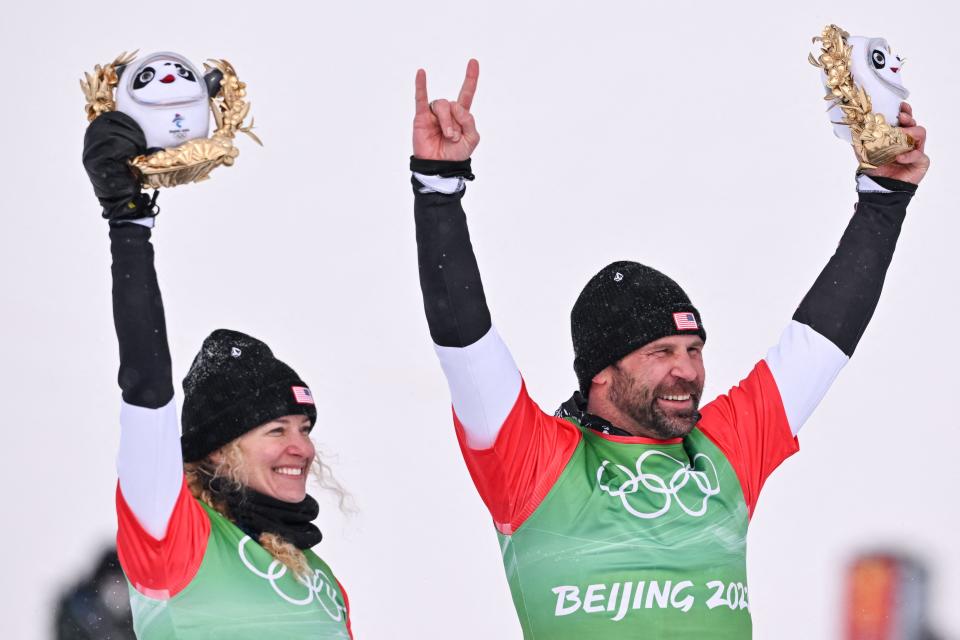
Maybe it could have focused on my 17-year struggle to get to this moment: Nick Baumgartner, the only Olympian who worked construction during the summer to pay for his dream, slinging concrete with a shovel, breaking his back and busting his hands, trying to save up just enough money so he could live out of a beat-up, crusty old van while training.
Maybe it could have focused on my personality: Nick Baumgartner, a loud and obnoxious guy by his own admission who is actually a fun-loving teenager stuck in a grown man’s body, always cracking jokes and laughing, smiling and messing around, trying to keep things light.
Or maybe it could have focused on my strange journey to reach that moment: Nick Baumgartner, a guy who played college football but gave it up to become a professional snowboarder, failed at three Olympic Games, won X Games, raced trucks professionally, and became a single father known to drive all night just to see his son, Landon.
Or maybe, it could have been even more blunt about my intentions: Nick Baumgartner just loves to beat the crap out of youngsters half his age while trying to show his son, not to mention everybody else back home in Iron River, that through hard work and persistence, you can achieve anything.
“Attention!” the starter said.
That command signaled the race would start within five seconds. I crouched, my feet strapped to a handmade, custom-built Oxess board, taking several short, quick breaths. One last chance to get ready. The next few minutes would change the trajectory of my life — for better or worse. But I’ve lived on the edge my entire life, and at some point, you get used to it. You get comfortable in the uncertainty.
I was the most experienced racer in this race — the quarterfinal round of men’s snowboard cross at Genting Snow Park in Zhangjiakou, China — and the pressure was insane. I had already failed to medal at three Olympic Games, and I was running out of chances. Every athlete has an expiration date. The moment when the milk turns bad, when your body can’t do it anymore, and you get passed by the youngsters — although no one ever really knows when it will happen. But I was doing my darnedest to try to postpone it once again.
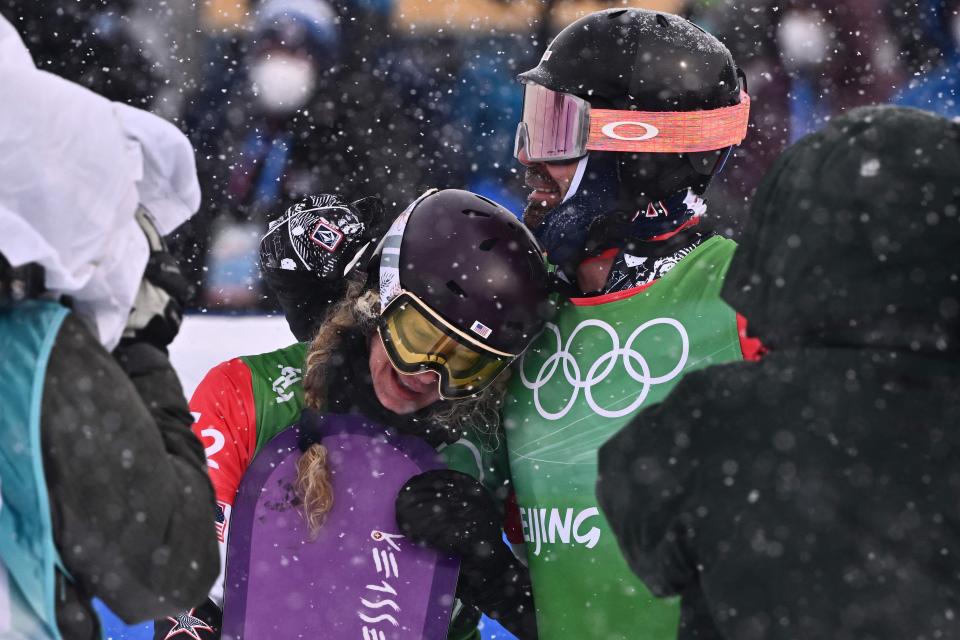
I grabbed the handles on both sides of the starting gate, coiled and prepared to explode out of the gate.
MORE FROM SEIDEL: U.P. native Nick Baumgartner lived out of his van while training for Olympic shot
The TNT broadcast switched from Beijing to the scene in my parents’ living room back home in Iron River, Michigan. Eleven friends and family members crowded together, some sitting shoulder to shoulder on a couch in front of a TV, pumping their fists on cue, clapping and cheering when they saw me. They were in the house where I was raised with my three older brothers, my younger sister, and a bunch of foster children. My parents would take in anybody who needed help, teaching me the true meaning of love and family. Some of the most important people in my life were in that room: Landon; my mom and dad; my sister, her boyfriend, and his kids; and a bunch of Landon’s friends from school.
The TNT broadcast switched back to the scene in Beijing. As the camera focused on my face again, the announcers started to re-introduce me to the nation, rehashing how I did at the 2018 Winter Olympics. To the general public, Olympians seem to reappear in four-year intervals, popping into view and then quickly fading into the background.
“His son Landon was at the last Olympics — I met him there,” said Todd Harris, the NBC snowboard play-by-play announcer, working his sixth Olympics with the network. “It was really cool in 2018. Nick really wanted to show Landon how hard work pays off, right? Kind of setting goals. No matter the result or winning medals. I remember watching them at the last Olympics. It was a really special moment, even though Baumgartner didn’t win a medal.”
I finished fourth, which was nothing but no man’s land at the Olympics. They give medals for first (gold), second (silver), and third (bronze). But fourth? Nothing. Zippo. It’s called the wooden spoon.
Years ago, ABC showed features on Olympic athletes called “Up Close and Personal.” They took you behind the scenes with the athletes and shared their everyday stories. But in 2022, the Games were broadcast on multiple channels — sometimes spread across so many they were hard to find — and the human-interest side of the story was reduced to a few seconds of introduction. So a moment before the start of my race, TNT put up two pictures of me — “Up Close and Personal” style. They were a silly shot with Landon and another with my dog, Oakley, a black-lab/pit-bull mix rescue dog from the local pound. I love Landon more than anything in the world. He is my pride and joy — the greatest achievement of my life. Being a dad means more to me than anything, and the only thing I wanted was to make him proud. To teach him how magical things can happen if you make crazy dreams and just go for it.
More Seidel: U.P. concrete worker shares lesson of 4th-place Olympic finish with son
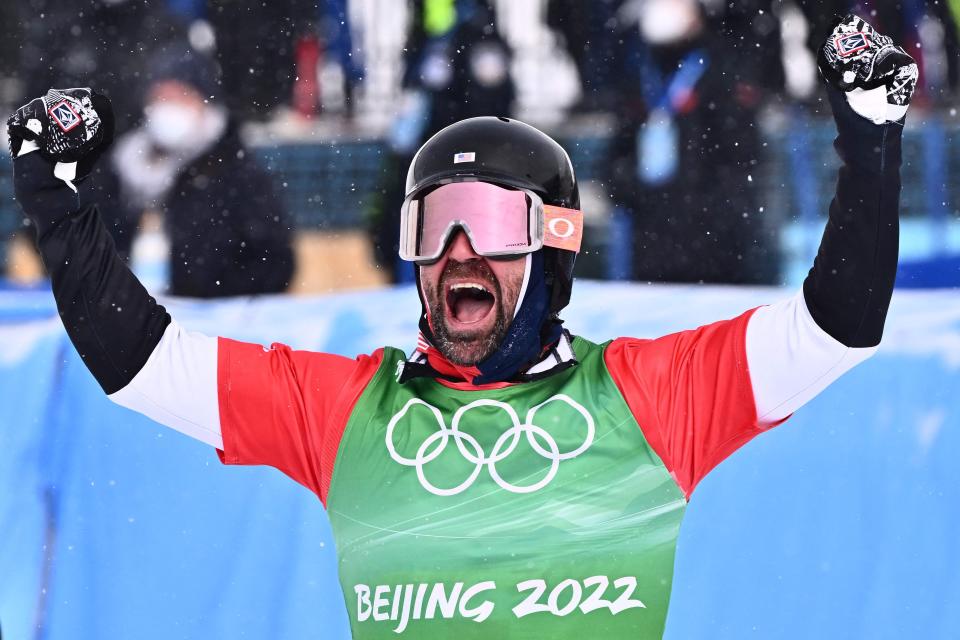
Oakley was my best friend. We had been together for 13 years. All summer, when I lived out of a van training in Marquette, Michigan, Oakley never left my side. I pulled a mattress into the back of the van between the two wheel wells, and she slept beside me. She went with me everywhere. When I went to a training facility, Oakley was allowed to go in when it wasn’t busy. When I went for long mountain bike rides — one of the secret keys to my training — I’d chain her up outside the van, and she waited for me to return. I’d put out water and a big piece of carpet and her memory-foam bed for her, of course.
“Nick has a heart of gold,” said Seth Wescott, the snowboard analyst, previewing my race. “In 2011, when he won the X Games, Landon was there as well. I just want to see him pull this one out here today.”
As Seth finished his sentence, the starting gate dropped, and I shot onto the course with the three other racers.
I had a slow start, like always. Getting older sucked. Jake Vedder had the fastest reaction and took the early lead, although only by a fraction of a second — less than the time it takes to blink your eyes. Vedder, a 23-year-old from Pinckney, Michigan, was put on this Olympic team at the last second because he replaced Alex Deibold, one of my friends who had suffered a head injury at a qualifying race at the Cortina d’Ampezzo World Cup in Italy.
Julian Lüftner, a 29-year-old police officer from Austria, had the second-fastest start (0.06 seconds behind Vedder). I always gave him crap, telling him that cops are always chasing other people. But if you chase me, you are behind me. He was a really good friend of mine.
I was in third place (0.07 seconds behind Vedder).
The final racer was Yoshiki Takahara, a 24-year-old from Japan.
I’ve competed against all three of them multiple times. It was typical for me to start out behind the youngsters. I wasn’t surprised. As I’ve gotten older, my reaction time has slowed, and my fast-twitch muscles stopped twitching so fast and started aching. I’ve spent the second half of my career having to chase people down after a slow start. About five seconds into the race, we got our first big surprise when Takahara wiped out going over one of the rollers in the start section.
“Down hard is Takahara,” Harris said on the broadcast.
He had crashed going over one of those camel humps. “But it’s not over until it’s over,” Harris said. “Anything can happen even with three remaining on the course.”
I pulled into second place, settling in behind Vedder. I was confident I could win a medal if I could just survive the early rounds and get to the finals. I had been riding fast. I just needed a chance to prove it. This course at the Genting Snow Park suited me perfectly. I felt confident on it after taking third place in the men’s big final at the snowboard cross Olympic test event in November 2021.
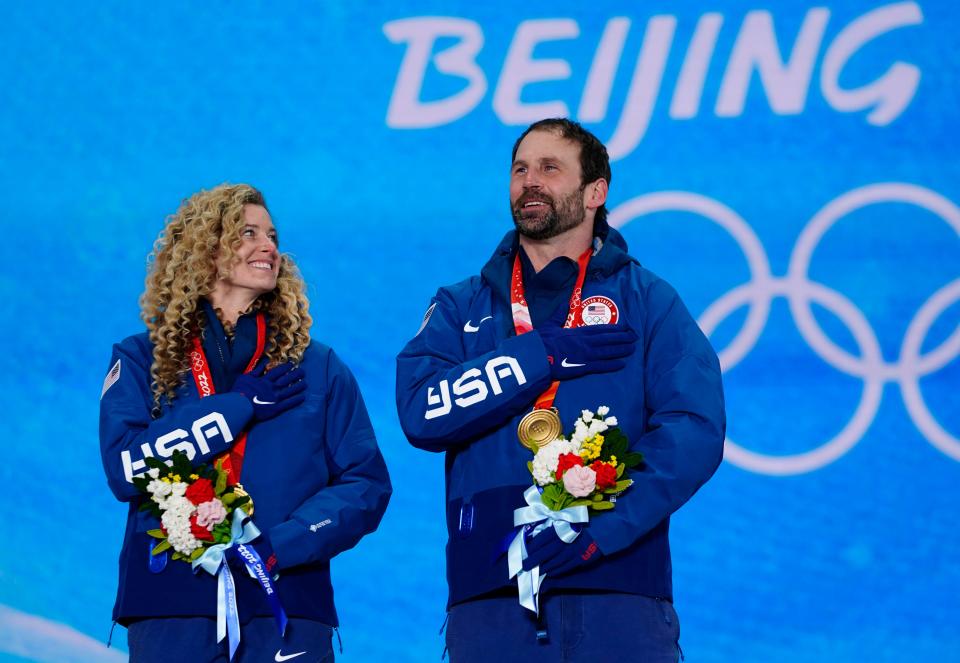
This course was slower and flatter than many courses I had competed on over the years — perfect for me, an aging athlete, somebody who had lost a little strength and explosion. But I could make up for it with knowledge and instincts gained over a lifetime of racing. When you race at a slower speed, it becomes tight racing, and you’ve got to make split-second decisions — the kind I’ve made a million times. In a slower race, everything becomes more unpredictable, especially in tight racing. And I was going to need all that wisdom to advance and win a medal.
“Right now, it’s the blue bib of Jake Vedder from the United States in the lead,” Harris said. “In front of his teammate, Nick Baumgartner. So the Americans, one and two right now. Will they advance to the semifinal?”
We went over a series of jumps.
“Yeah, and I hope they are talking to each other,” Wescott said. “They can’t back off. They need to work as a team a little bit here to keep Lüftner shut down.”
Yes, we actually talk to each other during a race. Even though we are flying down a mountain at highway speeds. Even though we are taking crazy jumps. Even though we are carving hard through turns. Even though we are trying to beat each other. We talk all the time. I’ve always been super vocal. If I’m going into a corner and there’s someone there and they are not leaving me a lot of room, I yell, “On your inside!” I want them to have that information, trying to keep both of us safe. They can do whatever they want with it. I’m 6 feet and 215 pounds. If I yell at you and tell you I’m on your inside, and if you close that door on me, I’m not gonna slow down. I’m gonna charge right through you. If you don’t give me enough room, I promise you … if I fall down, you’re probably coming with me.
About 42 seconds into the race, I went over a jump and soared into first place as Vedder slipped into third.
“Lüftner hunting them down,” Harris said on TNT. “Taking that outside line right there, Seth, can he do it?” Everything was going fine. We went through turn one, turn two, and a long straightaway that funneled into a set of three big jumps in a row. I made too big of a move off the lip, so I could fly it lower. Jake and I didn’t fly far enough and didn’t clear the jump. That allowed Lüftner to draft us and get up alongside of us. Then he slipped in front of Vedder. “Trying to make the pass,” Harris said on TNT. “A little bump-and-grind. Jake Vedder now in third place.” Going into turn four, Julian caught me and cut to the inside. “Nick is running a great race,” Seth said on the TV broadcast. “This is going to come down to one of these photo finishes.”
Then everything went horribly wrong. Julian exited into my path and a voice screamed in my head, Ah! No! I was just about to double the next two rollers. I was thinking, If he keeps coming, I’m gonna get hurt bad.
I pumped my arms and legs as hard as I could, trying to generate speed on my own. Rather than jumping from one roller to the next, I tried to ride through them. If I didn’t, he would exit right into me. I went to pump the second roller, but I was going too fast, and rather than gaining momentum on the backside, I caught a little air and landed flat, a costly mistake. It was like pumping the brakes on a car while cruising down the freeway. I lost momentum immediately, slowed to a crawl, and the other two shot by me.
“A little mis-timing by Baumgartner,” Harris said.
“Oh!” Wescott screamed.
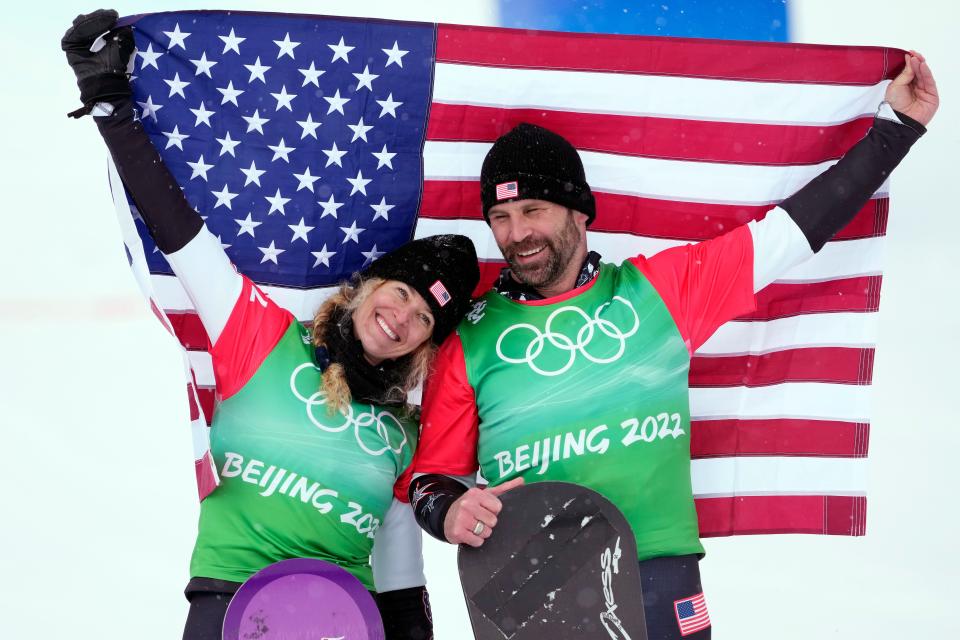
He knew it. I knew it. It was over. At that moment, I had almost no chance of winning, much less advancing. Not unless one of them crashed. I had lost too much momentum and too much speed to catch them.
We went into the next corner, and Jake and I kind of ran into each other as he was passing me. But that didn’t matter. That wasn’t Jake’s fault. That didn’t affect my race. I had already lost my speed. I was already dead in the water, and I could already sense my Olympic career coming to an end.
“Jake Vedder now in second place,” Harris said. “He’s in the transfer position. And right now, it is Nick Baumgartner running out of real estate, circling the drain as we come down. Baumgartner will not make it through.”
Circling the drain, all right…my dream was heading for the sewer. One mistake. One stupid mistake.
I took the last jump standing up, in full submission mode, having already accepted my fate. It was over. The emotion was already hitting me as I crossed the finish line in third place — no man’s land in the quarterfinals. Only the top two advanced. I was toast.
“Jake Vedder, who came here to replace Alex Deibold, is the lone American to make it through to the next round,” Harris said.
I was crushed. Everything I had dreamed about for 17 years, everything I had worked for, a lifetime of training, a lifetime of dreaming, had vanished in a matter of seconds.
At the bottom, I unstrapped my boots and kicked my board slightly. The finality smacked me in the face — a painful, stinging disappointment. This was my fourth Olympics and maybe my last. I tried to keep it all inside, like a volcano with a thin, weak cap over the top. But I still had several media obligations.
We had to stand by the Olympic backdrop as NBC filmed the results. Vedder was excited. To be expected; he should have been. He was advancing to the semifinals in his first Olympics. But it felt like I was walking through a foggy, painful blur — with all the emotions washing over me. We walked out and an official grabbed me: “All right, you’ve got to go to the mixed zone.”
The mixed zone was a long, winding plastic fence, set up like a maze, filled with reporters and TV crews on the snow at the base of the mountain. The first interviews were typically reserved for media members with broadcast rights — like NBC or TNT. Then you continued walking through the maze, like cattle going through a chute, talking to reporters from the wire services. Then a group of reporters from the United States. Then reporters from other countries. You did similar interviews over and over, talking about the race, spending just a little time with each reporter. I knew what they would ask.
How does it feel? What went wrong? Are you going to retire now?
I couldn’t do it. Couldn’t answer those questions, not at a moment like this. The pain was too overwhelming and fresh. Besides, I didn’t have many answers. I had no idea what the future would hold. How do you explain everything that went into this moment in a quick sound bite? I had worked construction every summer, pouring concrete — hard, physical labor that left my body beat up — just so I could make enough money to snowboard all winter.
I lived out of a van, and I parked it anywhere I could find a spot, because I couldn’t afford a hotel while training. I didn’t just put my life on hold; I created a life around this one dream, trying to win a gold medal. And — pfft — it was gone in a blink. I felt like a failure, like I had let down the entire Upper Peninsula of Michigan.
For years, I had received tremendous support from my friends, family, and sponsors—just to get to this spot. To have this opportunity. Only to waste it. But there were others…plenty of people who thought I was nuts, who didn’t believe in me, and I did nothing to prove them wrong. Were they right all along?
“I need some more time,” I said to a media relations person. “Give me a second.”
I dropped my board, sat down in the snow, and cried for at least 20 minutes. I was mad and disappointed and embarrassed. The doubt was creeping in. The reality was screaming through my head: This is how my Olympics might end? Four Games and no medals? This is where the curtain comes down on a 17-year story?
No freakin’ way.
This article originally appeared on Detroit Free Press: Olympic snowboarder Nick Baumgartner's crazy race from U.P. to gold

